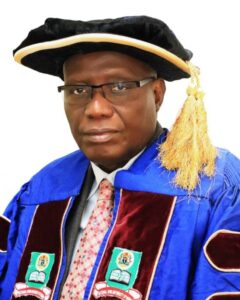
Vice-Chancellor of the National Open University of Nigeria (NOUN), Professor Olufemi Peters, has assured the students of the institution that the management is working hard to resolve all their concerns on exams, course materials, technical glitches with the university portal, and others.
The Director, Media and Publicity Ibrahim Sheme, NOUN, disclosed in a press release that Peters made the statement during a virtual town hall meeting he held with the students of the university on Saturday, September 21, 2024.
The innovative meeting, which was called to address a broad range of students’ concerns, highlighted the NOUN management’s efforts to improve examination systems, course material distribution, and refund processes.
The vice-chancellor emphasised the university’s commitment to resolving key issues raised by the students, ensuring a smoother academic experience.
One of the primary concerns discussed was the challenge students face with Computer-Based Tests (CBT) due to inadequate guidance and a lack of familiarity with exam procedures.
The vice-chancellor advised the students to pay close attention to exam instructions and reiterated the importance of adhering to the guidelines presented in question papers.
He acknowledged the challenges with CBT but assured them that improvements are underway, particularly with transitioning course materials.
Peters said: “We understand the frustrations some of you face due to the use of outdated course materials during exams.
“This is a result of the three-year cycle we use for reviewing the question bank.
“The solution is not lost, and we will make the necessary adjustments.”
The VC revealed that the university had detected attempts to compromise the integrity of the university’s TMA platform.
The attempted breach included the use of automated systems to generate responses, third-party participation in assignments, and other irregular activities that undermined the examination process.
According to him, “The University Senate’s initial response was to cancel all TMA scores of the affected students. However, rather than awarding them zero marks,it was decided to adjust their examination scores, allowing students to be graded out of 100 instead of the usual 70 or 60.”
He added that the university remains committed to upholding the integrity of its academic processes, adding, “We will take similar decisive actions if necessary, as it is vital to protect the integrity of our academic certificates and the reputation of the institution.”
He also addressed the issue of delays in refunding leftover funds in students’ wallets, citing the need for a thorough verification process before disbursements can be approved.
He assured the students that their refunds, including academic account balances, would be processed as quickly as possible once the necessary clearances are completed.
On the distribution of course materials, the vice-chancellor revealed plans to streamline logistics.
Currently, materials are sent to state capitals, where students collect them from their respective study centres.
Peters revealed that the university is exploring options to personalise the delivery process while keeping production costs manageable, saying, “We must ensure materials are distributed effectively without waste, as volume plays a crucial role in production costs.”
In response to a student’s inquiry about GST courses, the VC explained that certain courses must be completed to maintain accreditation standards.
He urged the students to complete those courses to avoid potential issues with graduation or certification.
He acknowledged the technical glitches with the student portal and other logistical challenges affecting exam scheduling and reassured students that the university is working on resolving the issues and improve communication through official NOUN emails.
He also expressed the university’s commitment to facilitating smooth transition for students entering at advanced levels and considering recommendations for streamlining graduation requirements.
The VC expressed gratitude for the active participation of students in the meeting and assured them that their concerns were being taken seriously.
He highlighted the university’s success and its efforts to expand services and improve infrastructure through partnerships with agencies like TETFund.
